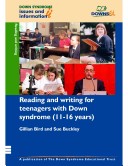Reading skills are often a strength for teenagers with Down syndrome. Teenagers can often read at a higher level than would be predicted from their general cognitive and language abilities. Those who have not achieved reading success in their primary years may make significant progress during their teenage years. Reading and writing skills are important for everyday life and for access to the world of literature. They are also powerful tools for developing the speech and language of teenagers with Down syndrome and for mediating their cognitive development. Reading and writing can support communication, enable teenagers to achieve greater independence and enrich education and academic attainments across the curriculum. This module explains how language and literacy teaching can work together to promote the development of teenagers with Down syndrome. Guidance on teaching methods, expectations and examples of teenagers' work combine to show teachers and parents how to include teenagers in literacy learning programmes, with an understanding of particular issues related to speech, language and memory development.
This module should be read in conjunction with Reading and writing for individuals with Down syndrome: An overview,[DSii-07-01] as the overview provides important background information on how individuals learn to read, the adaptations that will help pupils with Down syndrome, and the benefits of being involved in reading instruction.
- ISBN10 1903806127
- ISBN13 9781903806128
- Publish Date February 2002
- Publish Status Active
- Publish Country GB
- Publisher Down Syndrome Education Enterprises CIC
- Imprint Down Syndrome Educational Trust
- Format Paperback
- Pages 40
- Language English
